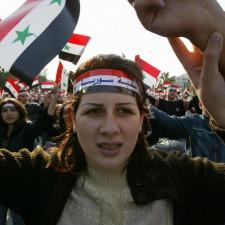BOB GARFIELD: Throughout most of the uprising against Syrian strongman Bashar al-Assad journalists have been on the outside looking in. While forces allied with Assad perpetrated one bloodbath after another, Syria kept its borders sealed, leaving the press to depend on secondhand accounts of atrocities in Homs and elsewhere. Now though, a number of Western news organizations have been granted visas, but has the presence of reporters on the ground confirmed the outside’s worst fears or made the situation murkier? Paul Danahar of the BBC says that as access has increased, so has the story’s complexity. Paul, welcome to On the Media.
PAUL DANAHAR: Thank you.
BOB GARFIELD: It must be very easy to report from Damascus because the narrative is so straightforward. Assad runs a brutal oppressive regime, and the West is frustrated at every turn from protecting the good guys, the opposition rebels. Pretty simple, right?
PAUL DANAHAR: In the beginning it was, unarmed protesters bravely standing up against men with guns. And it didn’t work. What happened was the regime just cracked down even harder. And so, some elements there of the opposition turned to a military solution to their revolution. Then other regional players started sticking their finger in the pie, countries like Saudi Arabia and Qatar. They actively began supporting the rebel groups with money and with arms. So that’s complicated, and also we’ve seen Jihadis, and they are answerable to no one. They have a lot of experience under their belt and they are the ones that everyone believes that behind these big bomb attacks.
BOB GARFIELD: So based on what you’re describing, even when the Assad regime makes these almost cartoonish accusations that the opposition is composed of terrorists and foreign agents, under the present circumstances there actually is some truth in that.
PAUL DANAHAR: Yeah, I think it’s become a bit of a self-fulfilling prophesy. He talked about there being Al Qaeda elements in Syria last year, and I think now there are Al Qaeda elements. So they’ve managed to worm their way into the structure of society because the society has become completely chaotic. His claim that the other governments are fiddling around in his back yard, they’re also true. He’s created the environment for the kinds of things he warned about happening to actually happen.
So I think we could have probably said in the beginning most of what the government said wasn’t true and most of what the opposition said was true. And now I think we have to say most of what the government says may not be true but some of it now probably is, and most of what the opposition said in the past was true, but some of it now probably isn’t.
BOB GARFIELD: This gets to the propaganda war that in your piece you said was now fully underway, where you can’t trust the people whom the press utterly depended on in the early days of the uprising, the citizens of Homs and the rebels themselves.
PAUL DANAHAR: Some of the claims they’ve made about the numbers there, so, what’s been going on has sometimes been exaggerated. And, to be honest with you, I think that’s not necessarily an unreasonable thing to assume.
The problem that we’ve got is in the beginning, because we saw the conflict completely in black and white, good guy/bad guy terms. We’re having to do a bit of a hand brake turn and say, hang on, we, we tend to be a little bit more – sophisticated and maybe cynical when it comes to information that we get from people that are not people that we know. And we’re just reapplying the old standard we should have always applied on all the information we get out of Syria now.
BOB GARFIELD: This inability to know what is coming from whom and why gets quite dizzying. There is even a charge from a British journalist that the anti-government forces lured him into what is essentially an ambush, which he believes was done in order to create a furor that a Western journalist was hurt or killed by Assad-loyal militias. Do you think that’s true?
PAUL DANAHAR: I spoke to someone who was actually there at the time. They certainly believe that it was true. But I think the key thing here is that because there’s no command and control structure within the opposition, the guys you might be working with are completely random. It’s like going into a bar and asking the first guy you see to kind of look after you while you go into a war zone. You just simply don’t know what you’re getting.
BOB GARFIELD: One final question, Paul. Before the press were gradually invited back into Syria by the Assad regime, the trajectory was just a gathering storm of indignation at the murderousness of Assad’s attacks on innocent civilians and toward some sort of international intervention. Now there are all those journalists there, portraying the situation in all of its complexity. Is it possible that truth itself, the truth about the complexity of the situation is being made a stooge of by Assad in order to take the momentum out of Western action?
PAUL DANAHAR: I do think that the government has begun to realize that putting in more foreign journalists may show just how messy it is and it may make people think, “Let’s not go there.”
But the other thing that it would also do is it would allow people to think about the problem of the day after, so that when people really do have to think about how they’re going to solve the messes in Syria, they’ve thought about it before, rather than suddenly being surprised by what they find when the conflict starts spilling out into parts of the region.
BOB GARFIELD: Paul, many thanks.
PAUL DANAHAR: You’re welcome.
BOB GARFIELD: Paul Danahar is the Middle East Bureau Chief for the BBC.

